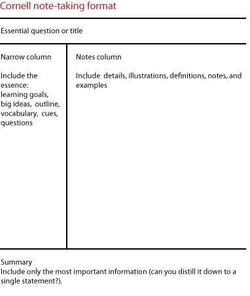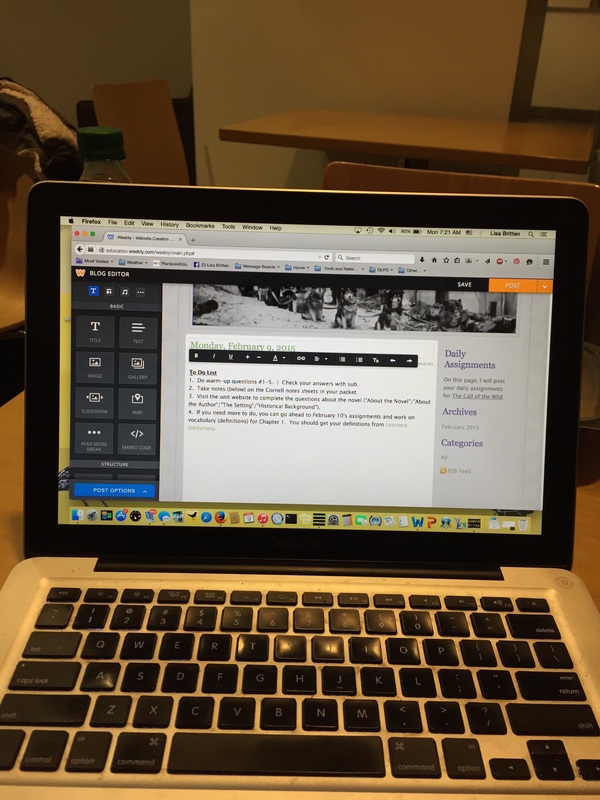 Good morning from Cleveland Clinic! My husband had a fantastic first day of recovery yesterday. He was able to get up and walk for a short distance five times yesterday, and got TONS of sleep last night. He's currently having another little snooze while I type this post for you guys. To the left is a pic I snapped of the Cleveland Clinic campus while I was in the parking garage this morning. You can see a little bit of the Cleveland Heights/Little Italy neighborhoods there. The building in green to the left is a brand-new Holiday Inn that they're constructing for visitors. People come to this hospital from all over the world. I hope you enjoyed Chapter One of The Call of the Wild yesterday. Were there any scenes that really popped into your mind like a movie? The novel has so much imagery in it! Remember, imagery is anything that appeals to the five senses -- so things that describe what you should be "seeing" in your mind or descriptions of sounds, scents, feelings, tastes, etc. Today, you'll be working on some questions related to Chapter One and preparing to read Chapter Two. **If you were absent on Tuesday, feel free to ask the sub to replay Chapter One. Your class can also ask for a replay if you feel like it would help you with the questions. You can listen along while you do your assignments. **Make sure you're keeping up on charging the Kindles and laptops! :) To Do List 1. Do warm-up questions #11-15. | Check your answers with the sub. 2. Take notes and add them to your Cornell notes pages. The notes are posted below. 3. Complete the five questions in your "workbook". Read each question carefully. There are only two PEAs but all questions required DETAILED answers. If you need more space, feel free to complete your questions on notebook paper and staple the paper into your booklet (label your notebook paper with today's date just in case it would come loose). 4. If you need more to do, you can work on vocabulary for Chapter Two. Cornell Notes primitive law - "might makes right"; those who are the strongest will rule others and have the power to determine what is "right" and "wrong"; Chapter 2 of The Call of the Wild is called "The Law of Club and Fang" to refer to the fact that primitive law is what is in charge in the new land that Buck has been taken to. Ex. "He was beaten (he knew that), but he was not broken. He saw, once for all, that he stood no chance against a man with a club. He had learned the lesson, and in all his afterlife he never forgot it. That club was a revelation. It was his introduction to the reign of primitive law... The facts of life took on a fiercer aspect, and while he faced that aspect uncowed, he faced it with all the latent cunning of his nature aroused." (Ch. 1) realism - Realism is a literary technique in which the author seeks to describe subjects as they really are. In The Call of the Wild, the author describes situations realistically (even though the main character is a dog, the dog is acting like a real dog would and responding to situations in believable ways). Naturalism is a type of realism. It describes things as they really are, but also attempts to determine "scientifically" the underlying forces (ex. the environment or heredity) influencing the actions of its subjects. In The Call of the Wild, heredity (ancient instincts) will help Buck cope with his new situation and learn to survive. The environment that he has been thrown into causes him to need these instincts. <-- This will be on your final test as a writing question, so make sure that you understand how it works and can give examples!
0 Comments
Good morning! I'm hanging out with my husband here in his room at the hospital. His surgery went well yesterday; the surgeon found three different places in his intestines that needed to be repaired. Today, my husband is pretty sore and tired, so it's going to be a very low-key day for us. He needs time to relax and allow his body to heal.
Here are your assignments for today. I did check for e-mails or blog comments from anyone and didn't see anything from you guys, so I'm assuming that you were able to figure out yesterday's work just fine; please comment if you need something. :) To Do List 1. Do warm-up questions #6-10. Check the answers with the sub. 2. Listen to The Call of the Wild and follow along in your Kindles. (Chapter One) --> You will need to have the sub play CD #1. Please listen to Tracks #1-38 as a whole class and follow along in your Kindles. --> Remember, it is each class' responsibility to keep the Kindles charged. If your Kindle is running out of battery life, make sure it gets plugged back in when you are done reading. Any Kindle that is showing a green light when it is plugged in is fully charged; you can switch the power supply cord from any fully-charged Kindle to one that needs to be charged. --> Keep the laptops plugged in when you're not using them as well! 3. Complete the activities in your "workbook" (vocabulary - please use Learner's Dictionary; sequence of events, character definitions and quality of life chart, plus one P.E.A.). If you are behind on assignments or would like a digital copy of the novel to use when finishing work, click here. Check back for my post tomorrow with your notes for Wednesday! :)
 Good morning from Cleveland Clinic! My husband should be heading into the operating room at any moment. I'll let you all know how it went tomorrow. :) To the right is an example of how to set up your Cornell notes. Put literature terms and big ideas in the column to the left, and put your notes in the notes column directly to the right. Cornell Notes **Please add the following to your Cornell notes for today.**
The information in purple doesn't need to be written in your notes. It's some extra information that you can look at to help you understand certain concepts better. setting - the time and place where a story occurs anthropomorphism - the showing or treating of animals and objects as if they are human in appearance, character or behavior epigraph - a piece of writing, short phrase, etc. that is used as an introduction to part of a book; epigraphs are usually related to the theme of the piece of literature that they precede Example: The epigraph from The Call of the Wild is the first stanza of a poem by John Myers O'Hara called "Atavism". Old longings nomadic leap, Chafing at custom's chain; Again from its brumal sleep Wakens the ferine strain. Mrs B's Note: **For a summary of what this stanza means, click here.** After we read the novel, we'll take a closer look at the epigraph and you'll see how it's hinting at what will happen later on during the book. :) atavism - the tendency to revert to ancestral type. In biology, an atavism is an evolutionary throwback; traits reappear which had disappeared generations before. Beginning The Call of the Wild with a poem called "Atavism" foreshadows what is going to happen to the main character, Buck, over the course of the novel. If you're interested in learning more, and seeing some real-life examples of how this works with animals, check out this "How Stuff Works" article on atavisms. foreshadowing - a literary device by which an author hints what is to come naturalism - a literary movement or tendency from the 1880s to 1930s that used detailed realism to suggest that social conditions, heredity, and environment had inescapable force in shaping human character. Example: Buck's environment and heredity (his instincts and the tendency for atavism to occur) will shape his character as the novel progresses. This post is for students who were absent on Friday, February 6. Today we did a timed writing prompt (this is your last one for this trimester!). If you missed class, here is the topic:
The phrase “an eye for an eye” is well-known in many societies around the world. It means that if someone commits a crime, such as murder, it’s okay to do the same thing back to that person as punishment. Some people believe that this a good rule, and think, for example, that all people who are convicted of murder should be sentenced to death. Others disagree, saying that some crimes are too terrible to do back to the criminal; it would cause psychological stress for the people who had to give the criminal their punishment. In your opinion, is “an eye for an eye” a good rule to follow when punishing people for crimes? You should write a persuasive essay about this topic (introduction, two body paragraphs, rebuttal, and conclusion) and bring it to class on Friday, February 13, so that you can discuss it with Johvan and hand it in. The assignment that was due today was your warm-ups from the past few weeks. DO NOT give your warm-ups to the sub if you didn't hand them in on Friday. Unfortunately, it would be much better to wait until I return and give them directly to me. If you receive a low grade due to missing warm-ups and that makes you ineligible for sports, please e-mail me so we can make a plan. |
Daily Assignments
On this page, I will post your daily assignments for The Call of the Wild. ArchivesCategories |

 RSS Feed
RSS Feed
